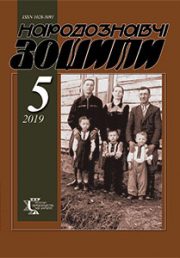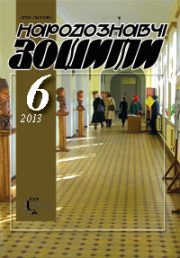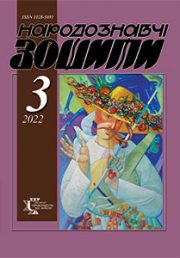The Ethnology Notebooks. 2022. № 2 (164), 327—336
UDK 801.81:179.8:335.48(477.86)
DOI https://doi.org/10.15407/nz2022.02.327
KACHMAR Maria
- ORCID ID: https://orcid.org/0000-0002-7811-9576
- Candidate of Sciences in Philology,
- Research Fellow at the Institute
- of Ethnology of the National Academy
- of Sciences of Ukraine,
- 15, Svobody Avenue, 79000, Lviv, Ukraine,
- Contacts: e-mail:mariakachmar@ukr.net
Abstract. The national liberation struggle of the Ukrainian people in the 1940s and 1960s highlighted both positive (consolidation of all vital forces in the most difficult period, desire for individual freedom, desire to live in their own state, heroism and sacrifice) and negative traits of national character, namely betrayal. Ethnopsychologists have devoted a considerable amount of research to this topic (O. Kulchytsky, G. Vashchenko, A. Furman, etc.). Folklorists also turned to betrayal in their works, tracing various aspects of its accumulation in insurgent poetry and prose (O. Kuzmenko, J. Zakalska).
The relevance of the article is to study the motive of betrayal in the narratives of national liberation themes of the mid-twentieth century in anthropological (individual choice of each, related to personal circumstances) and ethnopsychological (collective orientation due to national characteristics) contexts actualized through folklore memory.
The object and source base of the work are the texts of folk insurgent prose, recorded in the villages of Halych and Bohorodchany districts of Ivano-Frankivsk region in 2019 and introduced into scientific circulation for the first time.
The purpose of the article is to trace the accumulation of the motif of betrayal on the basis of a comprehensive analysis of insurgent narratives, to single out its varieties, in particular to find out the reasons (difficult circumstances, appearances, confessions, personal gain, money), pay attention to the formation of the image of the traitor with the help of typical and individual traits, to reveal the popular interpretation of such acts through the position of the narrator.
Structural-typological, textual, interdisciplinary method, field research method were used to fulfill the set goals and tasks.
The analysis revealed that the appearance of the motive of betrayal in the texts of insurgent folklore is due to the historical realities of the time (ruthless struggle of Bolshevik totalitarianism against the underground movement, amnesty, propaganda work with the local population), although undoubtedly related to the typical behavior of Ukrainians in similar situations of the past during the long foreign rule.
Keywords: insurgent narrative, betrayal, ethnic mentality, folk narrator.
Received 2.05.2022
REFERENCES
- Kulchytskyi, O., & Khramova, V. (Ed.). (1992). Ukrainian worldview. Ukrainian soul (Pp. 48—65). Kyiv: Feniks [in Ukrainian].
- Vashchenko, H. (1976). Educational ideal: a textbook for educators, teachers and Ukrainian families. Brussels; Toronto; New York [in Ukrainian].
- Furman, A. (2001). Ukrainian mentality and its cultural and psychological coordinates. Psychology and society, 1, 9—73 [in Ukrainian].
- Kalakura, Ya., & others. (2017). The mental dimension of Ukrainian civilization. Kyiv: Genesa [in Ukrainian].
- Britsyna, O. (2010). Twentieth century in the oral history of Ukrainians (notes on the historicism of folklore). In In search of his own voice. Oral history as a theory, method and source. Collection of scientific articles (Pp. 135—144). Kharkiv: TORHSIN PLIuS [in Ukrainian].
- Kuzmenko, O. (2018). Dramatic human existence in Ukrainian folklore: conceptual forms of expression (the period of WWI and WWII): monograph. Lviv: Institute of Ethnology [in Ukrainian].
- Zakalska, Ya. (2018). The motive is «betrayal» in the lyrics of national liberation struggles of the first half of the twentieth century. Scientific notes of Taurida National V.I. Vernadsky University. Series: Philology. Social communications, 4 (Vol. 29 (68), pp. 194—199) [in Ukrainian].
- Kyrychuk, Yu. (2003). Ukrainian national movement of the 40—50s of the XX century: ideology and practice. Lviv [in Ukrainian].
- Yaniv, V. (1993). Essays on the history of Ukrainian ethnopsychology. Essays on the history of Ukrainian ethnopsychology (Pp. 1—100). Munich [in Ukrainian].
- Lypa, Yu. (1953). Appointment of Ukraine. New York: Naklad Ukrainskoi Knyharni «Hoverlia» [in Ukrainian].
- Myshanych, S. (2003). From fact to artistic generalization (the skill of the narrator). Folkloristic and literary works (Vol. 1, pp. 87—108). Donetsk [in Ukrainian].
- Yarema, Ya. (1938). Ukrainian spirituality in its cultural and historical manifestations. The first Ukrainian Pedagogical Congress. 1935. (Pp. 16—88). Lviv [in Ukrainian].
- Yaniv, V. (1993). Religiosity of Ukrainians from the ethnopsychological point of view. Essays on the history of Ukrainian ethnopsychology (Pp. 174—196). Munich [in Ukrainian].
- Krymskyi, S.B. (2008). Under the signature of Sophia. Kyiv: «Kyivan Mohyla Academy [in Ukrainian].
- Dashkevych, Ya. (1991). Ukraine on the border between East and West (XIV—XVIII centuries). Notes of the Shevchenko Scientific Society (Vol. 222, pp. 28—44) [in Ukrainian].
- Yaniv, V. (1993). Ukrainian temperament and our educational ideal. Essays on the history of Ukrainian ethnopsychology (Pp. 196—217). Munich [in Ukrainian].






